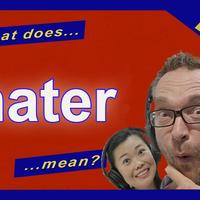What does 'hater' mean? - The English We Speak - YouTube
Feifei: Hello, and welcome to The English We Speak,
with me, Feifei…
Neil: ..and me, Neil.
Feifei: Hey, Neil. Would you like to try this new
coconut smoothie I bought from that new cafe?
Neil: Coconut? Yuk, I hate coconut!
Feifei: Oh, right.
Neil: In fact, I hate that new cafe.
It's too expensive.
Feifei: But it's good quality,
and the staff are very pleasant.
They always smile and say ‘hello'.
Neil: I hate talking to people in the morning.
Feifei: Oh dear, Neil – you're very negative.
‘Hate' is a very strong word.
You're a perfect example of a ‘hater'.
This describes a negative person who
dislikes someone or something
– but not everything, unlike you, Neil!
Let's hear from some other ‘haters'…
Examples: I'm a real hater of restaurants adding a
fixed service charge to the bill.
Why can't I choose how much to tip?
My wife's a hater of horror films,
so we had to go and see a romcom
at the cinema instead!
Feifei: So those are examples of ‘haters'
– negative people who dislike someone or something,
and sometimes without good reason - like Neil.
Neil: I hate it when you call me names!
But, Feifei, I am allowed to dislike things
and I'm not as bad as modern ‘haters'.
These are people who write unpleasant things
about someone on the internet, like this…
Example: I wish I had ignored the haters who criticised
my acting career on my blog.
It's really knocked my confidence.
Feifei: Not nice!
That's an example of a ‘hater' who writes unpleasant
things about someone on the internet.
Neil: Someone like this often criticises someone
unfairly, or without good reason.
It can be very discouraging.
Don't you just hate those kinds of people, Feifei?
Feifei: I do, but sometimes it's best just to ignore it.
Neil: Yes. Anyway, Feifei,
I know what I don't hate
– a nice cup of tea.
Do you fancy making me one?
…Oh, you're ignoring me now.
I hate it when you do that!
Feifei: Bye, Neil.
Neil: Oh, bye. Alright. Shall I put the kettle on?

